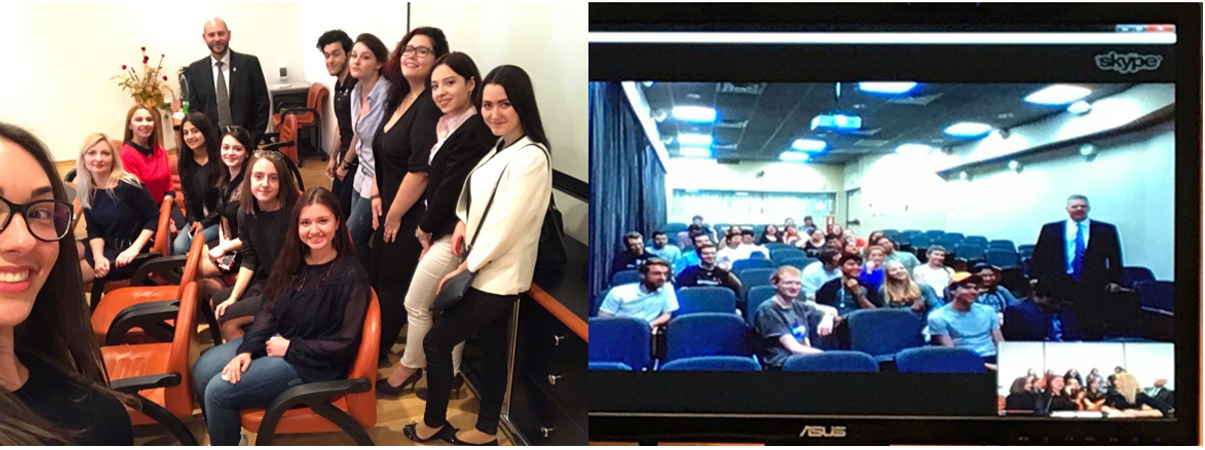
Students from Volgograd Institute of Management and American University.
With Kseniia Zheleznikova, assistant at the Department of Corporate Management and head of non-formal education in the Project Laboratory, at the Russian Academy of National Economy and Public Administration (RANEPA)’s Volgograd Institute of Management.
While formal ties between Russia and the United States are uncertain, Kseniia Zheleznikova’s students at the Volgograd Institute of Management engaged American students in some diplomatic bridge-building.
Zheleznikova was a delegate to Open World Leadership Program last year. She spent a week in Cleveland, Ohio, living with an American family and working with political communications professionals. In Washington, she joined a tour of the Library of Congress with American University’s Jim Quirk. They decided they should get their students together on Skype.
Russian students asked their American peers about political engagement in student government and local government. American students asked about Russia’s perspectives on Syria, President Trump, and the economy. Students at both universities are engaged in climate change issues and the environment. Each campus has held recent clean-up activities near parks and rivers, and both universities recently held film festivals focused on the environment.
Students also talked about more relaxed topics, like what kinds of things they do for entertainment—sports, movies, music, parties, and more.
After the videoconference, each group talked about the benefits of this kind of event. For most of the American and Russian students, it was their first activity of this kind. The planned 30-minute call extended to over an hour, and the students were eager to continue the conversation.
Russian students were impressed with the American students’ direct involvement in international and domestic policy issues—many worked on the 2016 presidential campaign and intern with Members of Congress. The Russian students emphasized the importance of personal and professional development, through efforts such as the scientific extracurricular activities available on campus. They wanted more informal seminars, joint projects conferences, and perhaps online academic competitions.
Finally, they noted the value of these “face-to-face” meetings: broadening horizons, fighting stereotypes, establishing professional ties, and insights that help shape personal and career strategies.The American students were similarly excited by the personal and professional nature of the exchanges, and look forward to continuing the conversation.
President Trump has proposed massive budget cuts to the Department of State and other “soft power” programs. But programs like Open World that sent Zheleznikova and her colleagues to the United States, and other U.S. government programs that have sent Quirk to Bosnia, Serbia, and other Balkan nations, help form relationships at a personal level. Formal government and business relations are critical, of course. But connections among students—the future government, business, and cultural leaders in Russia and the United States—can help establish long-term relationships and shape positive opinions and perspectives of each other.
The students at RANEPA-Volgograd and American University are big beneficiaries from these kinds of conversations. The United States Government should work to make more of them, not fewer. The students of Zheleznikova and Quirk will do their part, at least.
Special thanks for expert translation during the videoconference go to Dr. Ekaterina Stepanova, associate professor of the Department of Linguistics and Intercultural Communication, Volgograd Institute of Management.